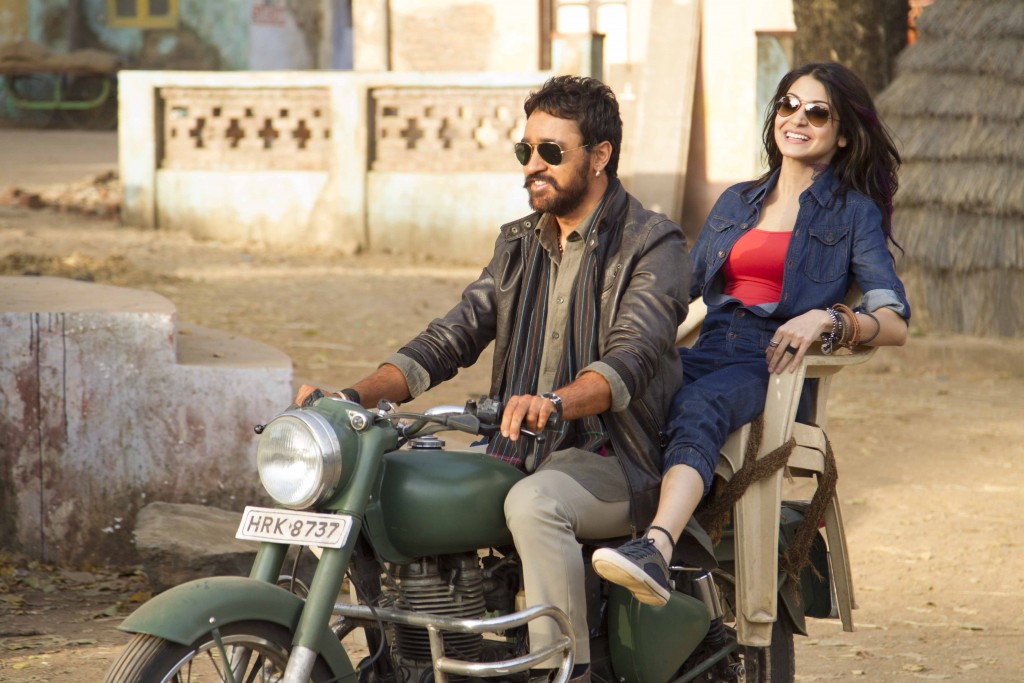In equal measures delightful and digressing, Matru Ki Bijlee Ka Mandola (MKBKM) is the result of truant genius at work.
Harry Mandola (Pankaj Kapoor) is a wealthy industrialist who loves his drink, his daughter Bijlee (Anushka Sharma). They both share an unusual bond they both share with Harry’s man Friday, Matru (Imran Khan). Much to her father’s delight, Bijlee is all set to marry Baadal (Aarya Babbar), the son of a powerful politician, Chaudhari Devi (Shabana Azmi). This alliance which is far from just being a simple union of two young people becomes the seed for a story that brings twists and turns in the lives of Matru, Bijlee and Mandola…
The film opens with titles that warn of how things like eating popcorn, walking after dinner, drinking too much water are all injurious to health. Followed immediately by saying how cigarette smoking is injurious to health. He’s got your attention. Is he trivializing the danger of cigarettes? Is he making a statement against generalized facts and conventional wisdom? Who knows. Either way, he follows this thought through in his film where his lead character is doing the right thing when drunk, and misdirected when sober.
The character of Mandola represents the acme of the film. It is superbly conceived and written, but it’s really Pankaj Kapoor’s marvelous rendition that takes the film several notches higher than would have otherwise been possible. In the quirky, slightly off-center world that Vishal Bhardwaj’s stories inhabit, Mandola and everything that happens around him represents the brilliance that the director is capable of. Where else would you find a tyrant zamindar getting drunk and leading his farmers to a revolt against himself? The madness of this opening act sets the tone and stage for the film.
In the portions where he stays true to this zaniness, the film is a treat. The scenes within themselves work very well – the opening scene, the scene where Imran and Pankaj ‘move’ the well, the climax scene. These have little to do with a larger narrative, and if viewed from the idea of a conventional screenplay, will come across as indulgences because their motive in moving the story or the characters forward isn’t always clear, if present at all. And that’s fine.Mani Ratnam said that it’s not always that the decision to do a scene in a certain way is obvious to the audience, and it doesn’t have to be so. But if there is a subtext to it, an inherent reason that guided the decision, the film will flow however abstract it may be to the audience. If the reason wasn’t good enough, it will not flow.
But somewhere, Vishal realizes he’s got a feature film to make – a story to flesh out, a villain to create, a hero to resurrect. Which, I think, is necessary, because quirky can only sustain interest a story for some time. So the problem with these elements is not so much their being present, but the inconsistency in the tone that often seeps in the narrative whenever they’re introduced. Much like Mandola’s Jekyll and Hyde persona, the film suddenly becomes a different beast, a betrayal of what it was all this while. And that jars. Specifically, the portion with Imran fixing a ‘deal’ on behalf of the farmers followed by rains destroying the crops. This is too staged, too melodramatic in it’s treatment and doesn’t fit in the film at all. Similarly, every time he tries to take the sentimental route between the daughter and the father, it seems heavy handed and needless. In fact, both of these ideas are the oldest of Bollywood tricks, and for a film that breaks unconventional ground so often, glaringly out of place.
As always, certain elements stand out. Art direction and locations are spot on. The setting is a Haryanvi village, and you never once realize it was shot in Gujarat. The beauty of it though, is the fact that the film operates in such a surreal world that these details don’t matter as much anyway! Great music is a given in Vishal’s films. And subtleties delight you the most, of course. A nod to Eric Kusturica, a personal cinematic influence. A cheeky self reference to his erstwhile Shakespearean inspirations. His use of the African folk music band through the film, right till the end.
He is very good with actors, and it shows with the performances of Imran Khan and Anushka Sharma. They both fit a stereotype in Bollywood – the cute urban hero and the spunky heroine. Well, their characters have strands of both, allowing them to operate from a familiar base and grow with the rest of the character. With Shabana Azmi, the theatrical portrayal of the wily politician is bang on, and the intelligence of holding and never letting it go over the top is an act that almost goes unnoticed. Of course it’s Pankaj Kapoor who owns the film. His slurs are almost inaudible, but almost. You will rarely miss a word or a line of what he says, that’s the level of control he brings to his role. We’ve seen many great drunken performances in Bollywood, and this one is right up there. He gives it all the shades of tyranny, comedy, and drama that his character has, and that color the rest of the film.
MKBKM is a loosely structured film that tries to balance the personal vision of a maverick filmmaker with a socially relevant thought. This is a hard tightrope to walk, and Vishal Bhardwaj often falters in his attempt. But it’s still a spectacle to watch.
Hindi, Comedy, Drama, Color


